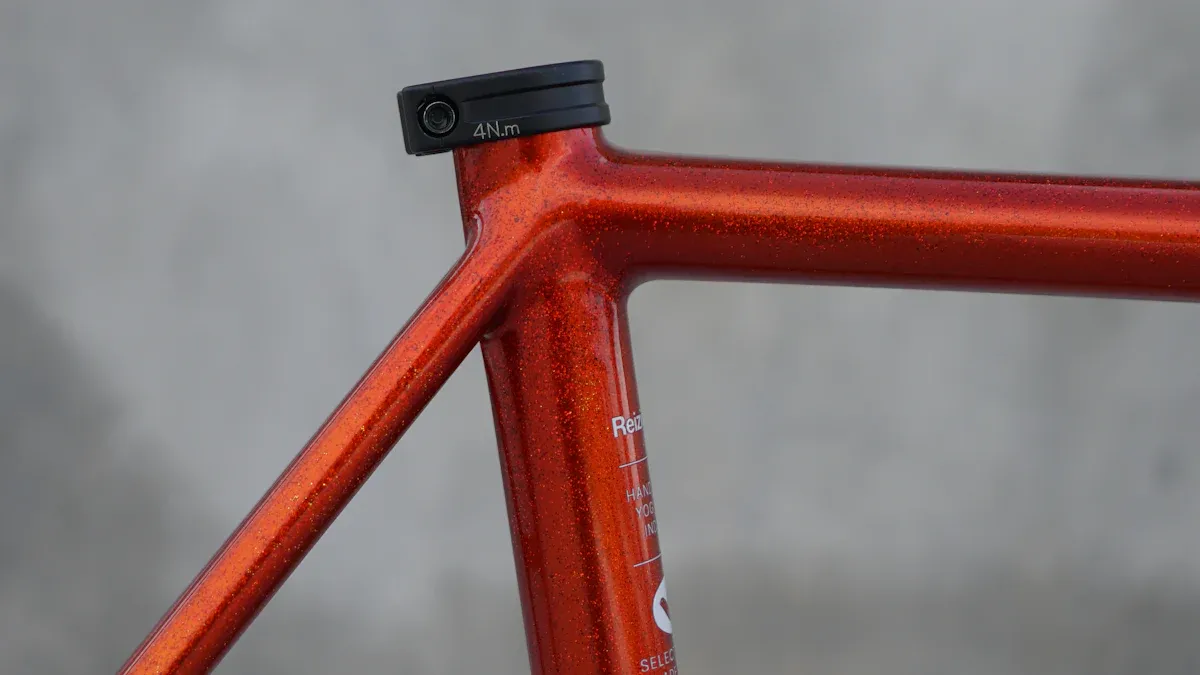
Durability is very important for bike frames, particularly when considering carbon bike frame durability. This is especially true for cyclists who want reliability and good performance. When picking between carbon and aluminum, think about how each one changes your cycling experience. Carbon bike frames are known for their strength and long-lasting nature, contributing to their overall durability. On the other hand, aluminum frames have their own mix of pros and cons. Important things to look at are lifespan, strength, and how much care they need. These factors can greatly affect your money spent and safety while riding.
Key Takeaways
Durability is very important when picking a bike frame. A strong frame keeps you safe and works well for a long time.
Carbon frames are light and strong but can break if hit hard. Taking care of them can help them last longer.
Aluminum frames handle hits better. They usually dent instead of breaking. They are also easier and cheaper to fix.
Think about how you ride when choosing a frame. Carbon is great for racing, while aluminum is better for daily rides.
Regularly taking care of both frame types can stop problems and make riding safer. This leads to a better cycling experience.
Durability Overview
Definition of Durability
Durability means how well a bike frame can handle wear, pressure, or damage over time. For cycling, it shows that the frame can take the stress of riding without losing performance. One expert explains,
“The ability to produce power under fatigue conditions” is very important for cyclists, especially on long rides where endurance is key.
This shows how durability is a key factor in a cyclist’s ability.
Importance in Cycling
When picking a bike frame, durability is very important. A strong frame keeps your bike safe and working well over time. Here are some main reasons why durability is important:
A strong frame can handle rough roads and different weather.
The materials, like carbon fiber or aluminum, give strength and resist wear.
Buying a durable frame means you won’t need to replace it often, saving you money later.
In fact, a good frame greatly changes how your bike looks, feels, and rides. Since the frame is usually the most expensive part, its durability matters a lot. You want to make a smart choice that improves your cycling experience.
To better understand what affects durability, think about these factors:
Factor | Description |
|---|---|
Material Choice | Different materials like aluminum and carbon fiber have special traits that affect strength and how long they last. |
Design | Good design and strong joints help spread loads evenly. |
Weld Integrity | Quality welding makes sure there are no weak spots in the frame. |
Testing Methods | Strict testing and real-life checks prove the frame’s durability in actual conditions. |
Corrosion Protection | Coatings and finishes guard against things like moisture and UV rays. |
Manufacturing Precision | Careful manufacturing removes possible weak points in the frame. |
Knowing these factors helps you see why durability is important when choosing a bike frame.
Carbon Frame Durability

Strength and Impact
When thinking about how strong carbon bike frames are, strength and impact resistance are very important. Carbon fiber is strong but light, which is why many cyclists like it. Still, it has some weaknesses. Carbon frames can be made thin to save weight. This can make them weaker against sudden hits. If you hit something from the side or at an angle, the frame might get damaged.
Even though it is strong, carbon fiber has a weak spot: It can break easily if hit from a different direction than it was built to handle.
Here are some common reasons for damage:
Weakness from being too thin.
Weakness against side hits.
Cracking when too much force is applied, since carbon doesn’t bend like metals.
On the other hand, aluminum frames usually dent or bend when hit. This gives you a warning before they break. This makes aluminum better for small crashes and daily use. While carbon frames are great at reducing vibrations and are light, they might not do as well as aluminum in impact tests.
Lifespan and Care
A carbon bike frame usually lasts about ten years with good care. Taking care of it can help it last even longer, sometimes more than aluminum frames. But, if it gets hit, it can lose its strength. To keep your carbon frame strong, try these care tips:
Clean and Check Often: Cleaning and checking can stop dirt from causing harm.
Avoid Hits and Pressure on Certain Spots: Be careful with the bike to keep the frame safe.
Keep Tires at the Right Pressure: Good tire pressure helps reduce stress on the frame.
Store Correctly: Keep the bike in a dry place and don’t lean it against hard things.
Fix Problems Right Away: Quickly repair any damage to stop bigger issues.
By following these tips, you can help your carbon bike frame stay in great shape for many years. Remember, getting a strong frame not only makes your ride better but also keeps you safe on the road.
Aluminum Frame Durability

Strength and Impact
Aluminum bike frames are strong and resist impacts well. They can handle daily rides and rough paths. Unlike carbon frames that might crack, aluminum frames usually dent. This denting lets you keep riding after small hits. You can fix problems without the frame breaking right away.
Here are some common ways aluminum bike frames can fail:
Failure Mode | Description |
|---|---|
Work Hardening | When metals bend too much, they get harder and can break more easily. |
Fatigue Limit | Aluminum can fail even with small stress after many uses. |
Corrosion | This is a process that can cause frame failure if not taken care of, affecting aluminum and steel. |
These points show why it’s important to know how aluminum frames act under pressure. They may not be as light as carbon frames, but they handle impact damage well, making them a good choice for many riders.
Lifespan and Care
The lifespan of an aluminum bike frame can change a lot. On average, it lasts between 5 to 50 years. This depends on design, quality, and how you use it. For regular use, expect it to last about 5 to 10 years. To help your aluminum frame last longer, follow these care tips:
Maintenance Routine | Purpose |
|---|---|
Dissimilar metal protection | Stops corrosion from different metals |
Stress point inspection | Finds weak spots that might break |
Corrosion prevention | Keeps the frame strong by cleaning it |
Fastener torque verification | Makes sure parts stay tightly fastened |
Regular care helps stop problems like corrosion and fatigue. Ignoring these can lead to big issues later. By keeping your aluminum frame in good shape, you ensure a safer and more fun ride.
Comparison
Cost-Effectiveness
When you think about the cost of bike frames, both carbon and aluminum have their good points. Carbon frames usually cost more at first. But, they are strong and perform well, which can make them worth the money over time. Here’s a quick look at the costs:
Frame Type | Initial Cost | Long-term Value | Resale Value |
|---|---|---|---|
Carbon | Higher | Worth it because of strength and performance | Keeps value better than aluminum |
Aluminum | Lower | Great value, might lose value faster | Good resale value, especially for well-known brands |
You might see that carbon frames give better long-term value because they last a long time with care. They can last for decades. On the other hand, aluminum frames usually last about 5 to 10 years. While aluminum frames are cheaper at first, they might lose value quicker.
Real-World Performance
In real-life cycling events, both frame types work well, but they meet different needs. Here are some important points to think about:
New aluminum frames can be made as light as carbon frames in some parts.
Comfort on regular roads is similar for both aluminum and carbon frames.
The choice of frame material should depend on how you plan to use the bike, like for racing or long rides.
Carbon frames are great for being stiff and comfortable on rough paths. But, new aluminum technology has helped make frames that also feel good to ride.
User reviews show that carbon frames can last a very long time but can break if hit hard. Aluminum frames usually handle hits better, getting dents and cracks over time. While you can fix carbon frames, aluminum frames are often cheaper to replace and usually can’t be repaired.
Repairability
When choosing bike frames, repairability is very important. Knowing how to fix carbon and aluminum frames helps you take care of your bike and stay safe while riding.
Carbon Frame Repairs
Fixing carbon frames needs special skills. Here are some ways to repair them:
For small cracks, wrap the area with more carbon and epoxy.
Sand the damaged spot, clean it with alcohol, and mix epoxy with hardener.
Place carbon sheets and repeat the coating for extra strength.
Let the repair cure for 24 hours before finishing.
You should also take off paint to see the damage and prepare for fixing. Tapering the damaged area helps the repair stick better. Matching the fiber direction of new materials to the original is key for keeping strength. Experts can fix a damaged carbon frame, but how well it works depends on how bad the damage is.
Aluminum Frame Repairs
Aluminum frames are usually easier to fix than carbon ones. Here are some common repair methods:
TIG Welding: This method often isn’t possible because it needs heat treatment afterward.
Low-Temperature Propane Torch Repair: Some people find this helpful for small fixes, but it might not work for big problems.
Propane/Alu Rods: These rods can help with minor repairs, but they act more like solder than a real weld.
While aluminum repairs can work well, ignoring them can cause big problems. A damaged aluminum frame may be less safe in crashes, making your bike riskier to ride. Weakening over time can also lead to losing control while biking.
In terms of cost, aluminum repairs are usually cheaper than carbon repairs. The complex making of carbon frames makes their repairs more costly. Knowing these repair options helps you make smart choices about your bike frame, keeping it durable and safe for your rides.
In conclusion, carbon and aluminum bike frames have different durability traits. Carbon frames are strong and last a long time. They are great for serious cyclists who want high performance. But, they can break if hit hard, which can be dangerous. Aluminum frames are usually not as strong, but they handle impacts better. They often can be fixed after small crashes.
Think about how you ride when picking a frame:
For racing: Go with aluminum because it is light.
For long-distance touring: Choose steel for comfort and strength.
For leisure riding: Comfort might be more important than performance.
In the end, knowing these differences helps you make a smart choice. This choice can improve your cycling experience and keep you safe on the road.
FAQ
What is the main advantage of carbon bike frames?
Carbon bike frames are very strong but light. They reduce vibrations, making rides more comfortable. This is great for serious cyclists who want good performance and durability.
How do I maintain my aluminum bike frame?
To take care of your aluminum bike frame, clean it often, check for rust, and look at the fasteners. Good care helps it last longer and keeps you safe while riding.
Are carbon frames worth the investment?
Yes, carbon frames usually give better long-term value because they are strong and perform well. They can last longer than aluminum frames, making them a smart choice for serious cyclists.
Can I repair a damaged carbon frame?
Yes, you can fix a damaged carbon frame, but it needs special skills. For small cracks, you can use epoxy and carbon sheets. Big damage might need a professional to help.
How does frame material affect safety?
The material of the frame affects safety a lot. Carbon frames can break if hit hard, while aluminum frames usually just dent. Knowing these differences helps you pick a safer choice for how you ride.
See Also
Evaluating Aluminum Bike Frames: Durability Pros and Cons
Comparing Enduro Bike Frame Materials for Strength and Durability
Understanding Carbon, Aluminum, And Steel Bike Frames For Buyers
Tips for Comparing Carbon Race Bike Frames for Performance
Performance and Durability Insights on Chinese Carbon Bike Frames
